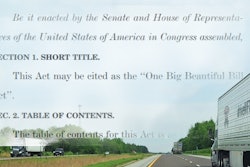Trucking news and briefs for Thursday, May 29, 2025:
FMCSA repeals carrier routing regs, amends civil penalties schedule
The Federal Motor Carrier Safety Administration announced two final rules that will take effect Friday, May 30, along with 18 rulemaking proposals, all part of deregulatory efforts spurred by the new Trump administration.
The two final rules that take effect immediately:
- Repeal outdated for-hire motor carrier routing regulations, which concern servicing municipalities and unincorporated communities
- Amend the Federal Motor Carrier Safety Regulations (FMCSRs) to remove the reference to rules under the Department of Transportation’s “Procedures for Transportation Workplace Drug and Alcohol Testing Program” from the civil penalty schedule in the FMCSRs. The civil penalty schedule instead will refer solely to the part of the Code of Federal Regulations (CFR) where this program is incorporated into the FMCSRs.
In removing the carrier routing regulations in 49 CFR Part 356, FMCSA said the regulations are unlawful because they exceed FMCSA’s statutory authority following the transfer of rules from the Interstate Commerce Commission (ICC) to the Federal Highway Administration (FHWA) in 1995, which were carried over to FMCSA in 2000.
The agency determined that it’s not authorized to include routing limitations when granting operating authority to U.S.-domiciled motor carriers and, as such, the routing regulations “are unlawful and obsolete. FMCSA is therefore removing these regulations.”
In the other final rule related to amending the FMCSRs, FMCSA said it last updated 49 CFR part 386, which sets out the rules of practice for administrative adjudications, in 2005. As part of that update, a reference to 49 CFR part 40 was added to Appendix B(a)(1), which specifies the penalty for recordkeeping violations.

Yet 49 CFR part 40 contains DOT’s drug and alcohol testing rules, which FMCSA does not directly administer. Instead, motor carriers are required to comply with part 40 through FMCSA’s incorporation of those requirements into the FMCSRs in part 382, which is already referenced in Appendix B(a)(1).
FMCSA determined that “the reference to part 40 was added in error.”
“Consequently, FMCSA has determined this reference should be removed,” the rulemaking states. “Removing the reference to part 40 will have no effect on FMCSA’s enforcement programs, as any recordkeeping violations relating to controlled substances and alcohol testing would be cited under part 382. Further, removing the reference to part 40 here does not in any way change the Department’s general requirements under part 40 or those requirements as they are incorporated into the FMCSRs in part 382.”
Keep tuned to Overdrive in the coming days for more on the 18 proposed rules from FMCSA and how to comment on them. Publication was expected Friday, May 30.
[Related: Hours of service should be front and center in Trump DOT deregulatory effort: Truckers]
Federal judge keeps NYC’s congestion pricing in place, for now
A U.S. District Court judge has granted a request from New York’s Metropolitan Transportation Authority and other entities that temporarily bars the Trump Administration from taking action against the state for not ending the city’s congestion pricing program.
The DOT has been working this year to end the tolling plan that charges fees for vehicles entering Manhattan below 60th Street -- basically anywhere south of Central Park. The FHWA announced in February that it was terminating its approval of the pilot program for what's called the "Central Business District Tolling Program" (CBDTP) and gave New York officials until March 21 to stop collecting tolls. That deadline was later extended to April 20, then again to May 21.
Last month, Department of Transportation Secretary Sean Duffy outlined actions his department would take against the city and state if the tolling program continued, which included pulling funding of various projects.
In a May 28 order, District Judge Lewis J. Liman said New York officials established a likelihood that the DOT “acted arbitrarily and capriciously by purporting to terminate” the pilot program’s approval, adding the state groups “have adequately shown that they would be irreparably injured absent an injunction, and that the balance of the equities and the public interest support an injunction.”
The preliminary injunction will remain in place while the rest of the case plays out in court. Various filings are due by both sides throughout the summer, and the court noted it expects to issue its final judgement before the end of the year.
[Related: Beware toll-road text message collection scam: FBI]










